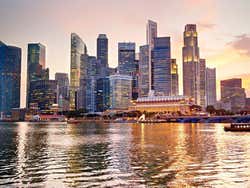
History of Singpore
Discover the history of Singapore, from its foundation in the 14th century, through the Second World War, and the independence of 1963, to the modern-day as "the Asian tiger".
Temasek Port or "City of the Sea" as it was known, was destroyed by the Javanese in the 14th century, and reborn as Singapore, "City of the Lion" after the Parameswara prince, the Malay "Alexander the Great" founder of the Malaca Sultunate.
Until 1819, Singapore was a fishing village, which the British sailor Sir Thomas Stamford Raffles, bought from the Sultan of Johore for the East India Company, hoping to open a route into China, and impede the expansion of the Dutch in the area.
In 1823 the Company incorporated Singapore into its Bengal empire, and in 1826 it became part of the Straits Settlements, a British Crown Colony: becoming the capital, and substituting Penang in 1837.
Its strategic position and status as a free port made Singapore an important trading centre, which attracted any number of Chinese immigrants, who quickly numbered more than the Malay population.
As a stop on the journey from the Indian to the Pacific oceans, and on the way to Hong Kong, Japan, and Indochina, its commercial importance grew, becoming the world centre of the rubber trade; and its importance only grew with the opening of the Suez Canal in 1869.
Singapore During WWII
In 1942, during the Second World War, Singapore was occupied by Japanese forces, who changed its name to Syonan or "Southern Light". Three and a half years later, on the 6th of September 1945, it was recaptured by British troops.
In 1946, Singapore became a British colony, separate from Penang and Malaca, and through various uprisings, in 1959 Britain recognised its autonomy within the Commonwealth.
In 1963 Singapore gained full independence, and was integrated within the Malay Federation, but would separate two years later due to disagreements with the federal government. It thus became a sovereign state.
From then, policies of neutrality and free trade agreements have made this little state a success story in terms of demographic, commercial, and financial growth.
This growth has meant the country has had to expand into its own territorial waters, making for diplomatic standoffs with neighbouring countries. Nine new islands have been reclaimed from the sea, and the Changi Airport itself was constructed on one.
